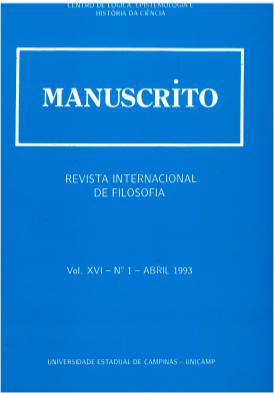Resumo
Usando definições probabilísticas de algumas atitudes mentais centrais, este artigo amplia trabalho anterior sobre referência dentro de mundos possíveis, dando uma teoria completa de atitudes proposicionais. O trabalho anterior utilizava o cálculo epsilon para simplificar e esclarecer a lógica modal dos predicados: principalmente a identidade de indivíduos se torna bem mais clara. Alguns detalhes deste trabalho são primeiro explicados antes de se usarem as definições probabilísticas para transferir os resultados para o campo geral das atitudes, e assim resolver vários problemas relativos à "opacidade referencial". Outros problemas também são resolvidos a caminho, em particular o de Kripke sobre a crença, e os de Hintikka sobre a onisciência, e sobre a crença no impossível.
Referências
Barwise, J. & Perry, J. (1983). Situations and Attitudes, (Cambridge, MIT Press).
Bertolet, R. (1980). The Semantic Significance of Donnellan's Dis tinction, Philosophical Studies vol. 37, 281-8.
Currie, G. (1982). Frege: An Introduction to his Philosophy (Brighton, Harvester).
Dennett, D.C.(1982). Beyond Belief in A. Woodfield (ed.) Thought and Object, (Oxford, Clarendon Press).
Devitt, M. (1974). Singular Subjects Journal of Philosophy.
Donnellan, K. (1966). Reference and Definite Descriptions, Philosophical Review, vol. 75, 281-304.
Edelberg, W. (1986). A New Puzzle about Intentional Identity, Journal of Philosophical Logic.
Fitting, M. (1972). An Epsilon Calculus System for First Order S4, Conference on Mathematical Logic. Bedford College 1970, Springer Verlag
Fitting, M. (1975). A Modal Logic Epsilon Calculus, Notre Dame Journal Contert, (Scottish, Academic Press).
Goddard, L. & ROUTLEY, R. (1973). The Logic of Significance
Griffiths, D. A. (1986). Reference, De Re Belief and Rigidity, The Canadian Journal of Philosophy.
Hazen, A. (1987). Natural Deduction and Hilbert's Epsilon Operator, Journal of Philosophical Logic.
Hintikka, J. (1962). Knowledge and Belief, (Ithaca, Cornell University Press).
Hintikka, J. (1975). Knowledge, Belief and Logical Consequence in his The Intentions of Intentionality and Other New Models for Modalities, (Dodrecht, Reidel).
Hintikka, J. (1979). Impossible Possible Worlds Vindicated in Game Theoretical Semantics (ed.) E. Saarinen, (Dodrecht, Reidel).
Hughes, G. E. and CRESSWELL, M. J. (1968). An Introduction to Modal Logic (London, Methuen).
Konolige, K. (1986). A Deduction Model for Belief, (London, Pitman).
Kripke, S. (1977). Speaker's Reference and Semantic Reference in Contemporary Perspectives in the Philosophy of Language, P.A. French et al eds, (Minneapolis, University of Minnesota Press).
Leisenring, A. C. (1969). Mathematical Logic and Hilbert's Epsilon (1979). A Puzzle About Belief in Meaning and Use, (ed.) A. Margalit, (Dodrecht, Reidel). Symbol, London.
Linsky, L. (1967). Referring, (London, Routledge and Kegan Paul).
Linsky, L. (ed.) (1971). Reference and Generality, (Oxford, Oxford University Press).
Loux, M.J. (ed.) (1979). The Possible and the Actual, (Ithaca, Cor) ,nell University Press).
Mellor, D.H., (1980). Consciousness and Degrees of Belief in Prospects for Pragmatism: Essays in Memory of F.P. Ramsey. D.H. Mellor (ed.), (Cambridge, Cambridge University Press).
Prior, A.N. (1962). Formal Logic, 2nd (ed.) (Oxford, Clarendon Press).
Prior, A.N. (1971). Objects of Thought, (Oxford, Clarendon Press).
Quine, W.V.O. (1960). Word and Object, (Cambridge, MIT Press).
Ramsey, F.P. (1978). Truth and Probability in Foundations, (ed.) D.H. Mellor, (London, Routledge).
Routley, R. (1969). A Simple Natural Deduction System, Logique et Analyse.
Routley, R. (1977). Choice and Descriptions in Enriched Intensional Languages II, III, in Problems in Logic and Ontology, eds E.Morscher, J.Czermak, and P.Weingartner, (Graz, Akademische Druck-und Velagsanstalt).
Routley, R. (1980). Exploring Meinong's Jungle, Departmental Monograph #3, Philosophy Department, R.S.S.S., A.N.U.
Routley, R., Meyer, R. & Goddard, L. (1974). Choice and Descriptions in Enriched Intensional Languages I, Journal of Philosophical Logic.
Russell, B. (1905). On Denoting Mind.
Slater, B.H. (1963). Talking about Something Analysis.
Slater, B.H. (1982) Incomplete Assertions Studia Logica.
Slater, B.H. (1986a). Prior's Analytic, Analysis.
Slater, B.H. (1986b). E-type Pronouns and Epsilon Terms, Canadian Journal of Philosophy.
Slater, B.H. (1987a). Hilbertian Tense Logic Philosophia.
Slater, B.H. (1987b). Fictions British Journal of Aesthetics.
Slater, B.H. (1988a). Intensional Identities Logique et Analyse.
Slater, B.H. (1988b). Contradiction and Freedom Philosophy.
Slater, B.H. (1988c). Prolegomena to Formal Logic, Gower.
Slater, B.H. (1989a). Hilbertian Reference, Nous.
Slater, B.H. (1989b). Consistent Vagueness, Nous
Slater, B.H. (1989c). Subjunctives Critica.
Slater, B.H. (1989d). Excluding the Middle Critica.
Slater, B.H. (1989e). Prior and Cresswell on Indirect Speech Australasian Journal of Philosophy.
Slater, B.H. (1991). Liar Syllogisms and Related Paradoxes Analysis.
Slater, B.H. (1992a). Conditional Logic Australasian Journal of Philosophy.
Slater, B.H. (1992b). Modal Semantics Logique et Analyse.
Slater, B.H. (1992c). Farewell to Opacity, Dialectica.
Slater, B.H. (1992d). Descriptive Opacity, Philosophical Studies.
Slater, B.H. (1992). The Epsilon Calculus and its Application, Grazer Philosophische Studien.
Slater, B.H. (1992f). Thought Unlimited, Mind.
Slater, B.H. (1992g). Routley's Formulation of Opacity, History and Philosophy of Logic.
Slater, B.H. (1992h). Probabilistic Foundations for Operator Logic, British Journal for the Philosophy of Science.
Smullyan, A.F. (1948). Modality and Description Journal of Symbolic Logic.
Stalnaker, R.C. & Thomason, R.H. (1968a). Abstraction in First Order Modal Logic, Theoria.
Stalnaker, R.C. & Thomason, R.H. (1968b). Modality and Reference, Nous.

Este trabalho está licenciado sob uma licença Creative Commons Attribution 4.0 International License.
Copyright (c) 1993 Manuscrito: Revista Internacional de Filosofia

